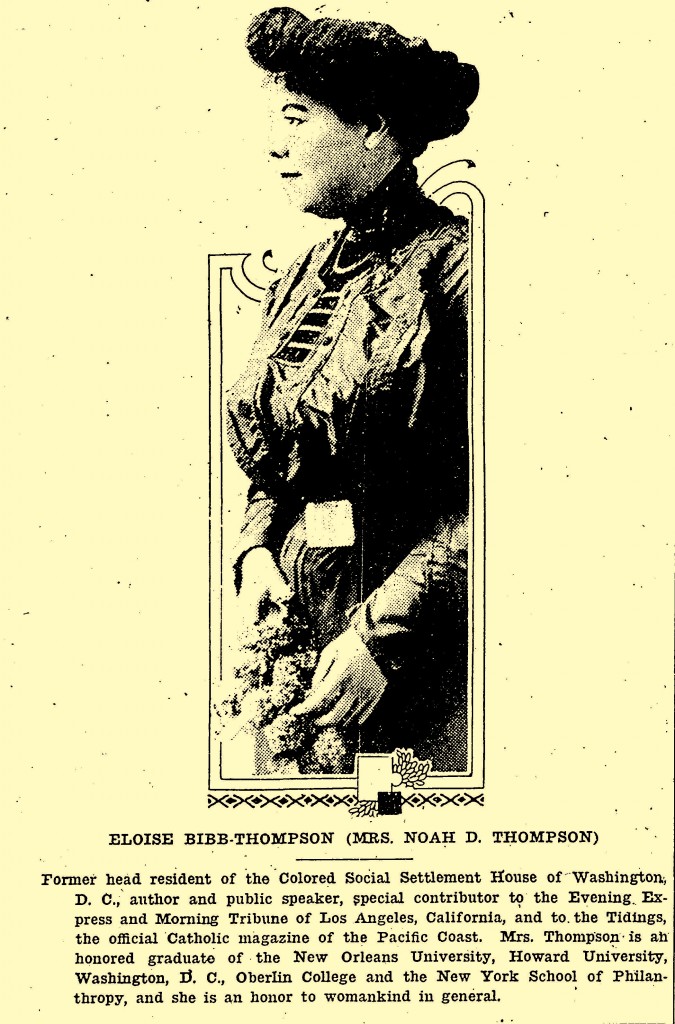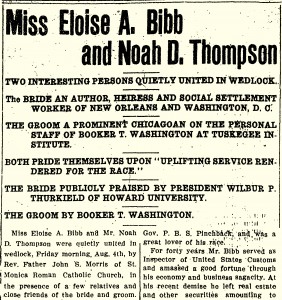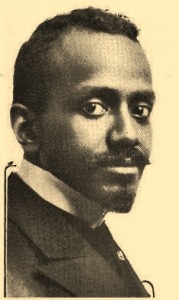All of New Orleans is abuzz over the recent selection of one of her native sons, Mr. Dean Baquet, to serve as Executive Editor of The New York Times. Before re-joining The New York Times, Baquet spent nearly a decade in editorial roles at The Los Angeles Times. We use this recent interest in things journalistic, to highlight another New Orleans Creole who had a successful journalistic career in both Los Angeles and New York.
Eloise Bibb was seventeen years of age when she made her literary début with Poems (1895), published by the Monthly Review Press in Boston. This small volume comprised of twenty-six poems includes “To the Sweet Bard of the Women’s Club,” a tribute to Alice Ruth Moore Dunbar-Nelson. Dunbar-Nelson like Eloise Bibb was a native of New Orleans and an acclaimed woman of letters. The ‘women’s club’ to which the title of the poem alludes was the Phyllis Wheatley Club of New Orleans, a prominent literary, civic, and social organization for ladies founded in 1894 By Mrs. Sylvanie Francoz Williams (see another of our posts for further information). Eloise dedicated her initial publication to Mrs. Williams as a testament to the esteem in which she was held.
Eloise Alberta Veronica Bibb was born on 29 June 1878, the daughter of Charles H. Bibb and Catherine Adele Brian. Her father’s position as customs inspector in the employ of the federal government ensured a comfortable upbringing for her.
Like most women of her day who sought a higher education, she prepared herself to answer the high calling of a teacher. She graduated from New Orleans University, which was located on St. Charles Avenue in that city and conducted under the auspices of the Methodist Episcopal Church. For several years she taught at McDonogh No. 24 School, one of the public schools of New Orleans. She then entered Oberlin College where she studied from 1899-1901.
Bibb furthered her education in Washington, D.C., graduating from the Teachers’ College of Howard University in Washington, D. C. in May 1907 and afterwards taking a special course at the New York School of Philanthropy at Columbia University. She served as matron of the Social Settlement House connected with Howard University from 1908 to 1911. Her mother, Catherine Adele Bibb died in Washington, D. C. on 17 April 1909. Her father died in New Orleans on 8 February 1911. Being his only child, she received the total of his estate which amounted to some $75,000. Later that year on August 4th, Eloise was married to a young widower, Noah D. Thompson, at Saint Monica’s Church in Chicago. (Thompson’s first wife had been Lillian B. Murphy, daughter of the founder of the popular Baltimore Afro-American newspaper). Thompson was employed by the United States Express Company of Chicago for many years before joining the faculty of the Tuskegee Institute. Eloise was no stranger to Chicago, as her half-brother, Joseph Charles Bibb, was an attorney there who served as an editor for the Chicago Whip, a black-owned paper.
Excerpt from article announcing the marriage of Eloise Alberta Bibb and Noah D. Thompson, 1911.
Soon after their marriage, the Thompsons moved to Los Angeles. There, in addition to engaging in a variety of other ventures including real estate, Noah and Elise contributed articles to various publications including the Los Angeles Tribune, Out West, Morning Sun, and The Tidings. Noah edited The Liberator of Los Angeles and later served on the editorial staff for the Los Angeles Tribune. For many years she was a special feature writer for the Sunday issue of the Los Angeles Tribune and the Morning Sun. Among her notable contributions to The Tidings, which was the official organ of the Diocese of Monterey-Los Angeles was an article, “The Church and the Negro,” and a beautiful, poem, “A Garland of Prayer.”
Noah D. Thompson, husband of Eloise Bibb Thompson
While in Los Angeles, Eloise Bibb Thompson also wrote three plays “Cooped Up,” “Caught,” and “Africanus,” all of which were produced in several cities to much acclaim. Mrs. Thompson and her husband were both practicing Catholics and took an active role in church work in Los Angeles. A lifelong learner, Eloise Bibb Thompson pursued courses at the University of Southern California and at New York University, where she was enrolled at the time of her death.
In 1927, when Noah Thompson was hired as business manager of the National Urban League’s journal Opportunity, the Thompsons moved to New York City. Eloise Alberta Veronica Bibb Thompson died on 8 January 1928 in New York’s Edgecombe Sanitarium.
Sources: Beasley, Delilah Leontium. The Negro Trail Blazers of California. Los Angeles: D. L. Beasley, 1919, page 254-255. “Miss Eloise A. Bibb and Noah D. Thompson Two Interesting Persons Quietly United in Wedlock,” Broad Axe (Chicago), 5 August 1911, page 2; The Washington Bee, 25 February 1911, page 8; Broad Axe (Chicago) 17 March 1917, page 4.






Can anyone help me to access the papers of Eloise Bibb Thompson? I am writing about her and want to have access to her papers.
Dr. Bertram, Thank you for writing to us at CreoleGen. Due to the fact that Mr. and Mrs. Thompson had no children, I doubt if any efforts were made to preserve family papers after their deaths. If any papers survive, they would likely be in New York City. Maybe Schomburg? Best of luck to you. Please update us about your research. – Jari Honora, CreoleGen.
Dr. Bertram, I am also doing research on Eloise Bibb Thompson. Specifically, I am looking for the scripts of two of her plays: “Reply to the Clansman,” and “Africannus.” If you have had any success locating her papers, I would love to hear from you!
I am still looking. If you find anything please let me know.
I am looking for a photo of Mrs. Thompson to include in a republication of my mother’s book, Invisible Poets: Afro Americans of the 19th Century. (Joan R. Sherman, 1974). She wrote about Mrs. Thompson and other poets. If anyone can help, please let me know. Thanks, Laurie Sherman
Ms. Sherman, the picture of Eloise Bibb Thompson that you see above seems to be the most widely available image of her. A better copy was published in Delilah Beasley’s Negro Trail Blazers of California, which has been partially digitized by California State University Northridge’s Special Collections & Archives https://library.csun.edu/SCA/Peek-in-the-Stacks/delilah-beasley – scroll down to the images.
`Thanks, Ms. Honora. Unfortunately, I don’t think a copy of a photo in that book will be high enough quality for re-publication but I will try and get a copy. Appreciate your help.